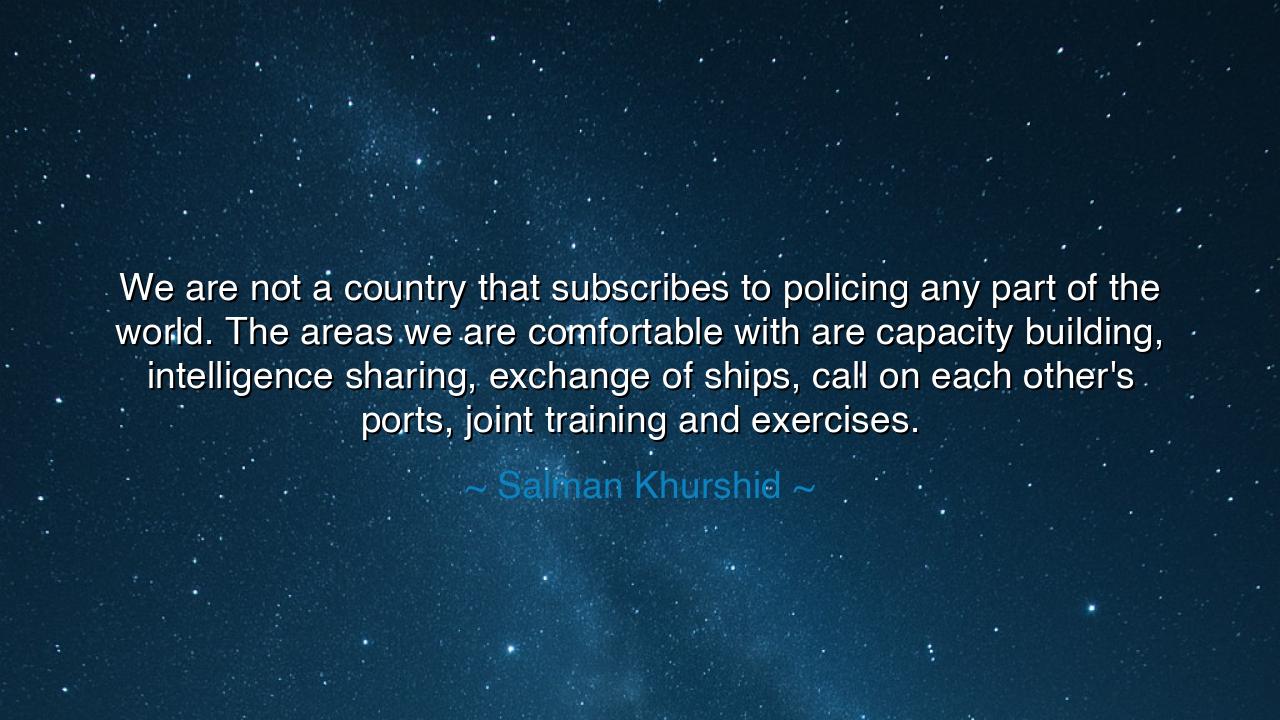
We are not a country that subscribes to policing any part of the
We are not a country that subscribes to policing any part of the world. The areas we are comfortable with are capacity building, intelligence sharing, exchange of ships, call on each other's ports, joint training and exercises.






In the words of Salman Khurshid, diplomat and statesman, we hear the tempered wisdom of a civilization that has seen both empire and enslavement, conquest and cooperation: “We are not a country that subscribes to policing any part of the world. The areas we are comfortable with are capacity building, intelligence sharing, exchange of ships, call on each other's ports, joint training and exercises.” In this declaration lies the voice of a nation that has chosen strength without domination, power without arrogance, and influence without imperialism. It is the creed of a people who understand that true might does not lie in ruling others, but in uplifting them.
The origin of this wisdom runs deep into the soil of history. India — the land from which Khurshid speaks — has known the heavy shadow of foreign powers. It has seen empires come with flags and fleets, preaching order while spreading conquest. Thus, when Khurshid declares that his nation does not “subscribe to policing any part of the world,” he speaks not only as a diplomat, but as the voice of a people who have endured the price of others’ ambitions. His words are the distilled essence of centuries — a reminder that the sword, though sharp, cannot build a lasting peace, and that cooperation, not coercion, is the path of the wise.
In the ancient world, the great empires of Rome and Persia, though mighty, fell to dust because they mistook control for harmony. They built walls and borders, but not understanding. Yet, in the East, kingdoms flourished that chose exchange over expansion — from the peaceful maritime trade of the Cholas to the scholarly bonds forged through the Silk Road. These were the civilizations that shared their knowledge, their ships, their wisdom, rather than their chains. Khurshid’s words echo that same tradition — a belief that partnership, not policing, is the truest mark of greatness.
When he speaks of “capacity building”, Khurshid invokes the spirit of the teacher, not the tyrant. It is the philosophy of empowerment — to strengthen others so that they may stand tall beside you, not beneath you. In a world often ruled by the language of dominance, this approach is radical in its humility. It says: We will not command you; we will walk with you. And this is no weakness — it is the highest form of wisdom. For he who teaches others to build becomes the architect of peace, while he who conquers becomes only the builder of resentment.
Consider the example of Ashoka the Great, emperor of ancient India. Once a conqueror drenched in the blood of battle, he stood upon the ruins of Kalinga and heard the cries of the fallen. There, he awakened to the futility of force and embraced Dhamma — the law of compassion. He sent not armies but envoys of knowledge, not fleets of war but messengers of peace. His empire endured not through domination, but through moral strength and shared prosperity. In this, Khurshid’s modern diplomacy walks the same path — to wield influence through collaboration, not conquest.
When Khurshid speaks of “joint training, intelligence sharing, and exchange of ships,” he outlines a vision of partnership rooted in trust. It is the belief that security is not achieved by standing above others, but by standing beside them. In an era where many nations seek to impose their will upon the seas and skies, this philosophy stands as a quiet rebuke — a reminder that cooperation breeds stability, while suspicion breeds war. The mightiest navies may rule oceans, but only mutual respect can make them peaceful.
The lesson in this quote is one of restraint and wisdom. To the individual as much as to nations, it teaches: do not seek power through domination, but through the empowerment of others. Share your knowledge, exchange your strength, train together rather than compete blindly. Just as nations find peace through cooperation, so too can souls find harmony through compassion. For the impulse to “police” others — whether in politics or in life — is born of fear and pride. But the will to build together is born of courage and love.
Therefore, let Khurshid’s words be a guide for all who would lead, teach, or create. Be not a ruler of men, but a builder of bridges. Be not the voice that commands, but the hand that helps. The true mark of civilization — and of the noble heart — is not in the number of its victories, but in the depth of its cooperation. As nations rise and fall, this truth endures: to share is to strengthen, and to empower is to endure.






AAdministratorAdministrator
Welcome, honored guests. Please leave a comment, we will respond soon